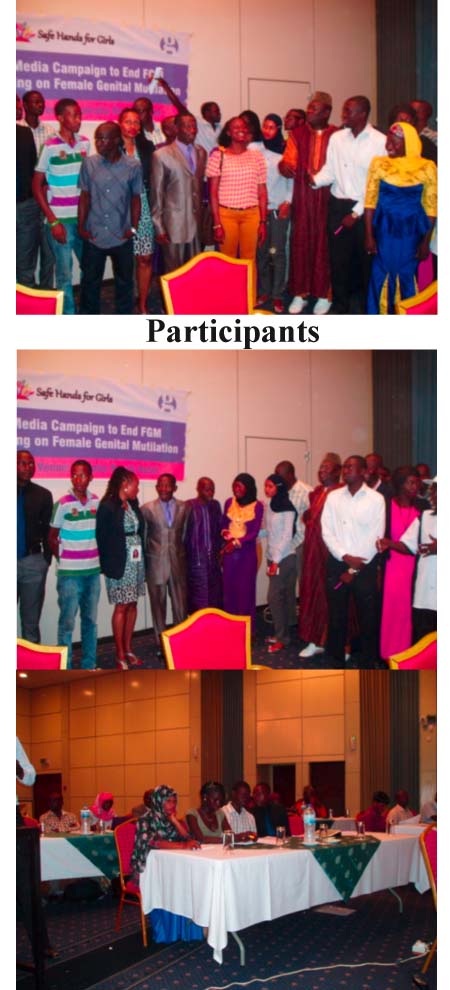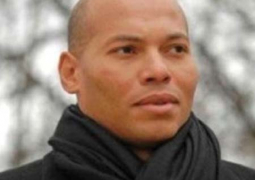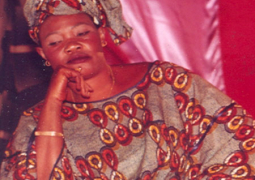
The pledge was made at a day’s training workshop organised by the Guardian Global Media Campaign to increase the knowledge of Gambian media practitioners when reporting or writing about FGM stories, and how to move from inside stories to front pages.
The training session was held at the Kairaba Beach Hotel, where the Guardian, a British newspaper backing the FGM campaign, facilitated the programme through the initiative of Gambian-born Jaha Dukureh, who was a survivor of FGM.
The training attracted media practitioners from the print, electronic and digital media outlets in the country.
Marie Jaha Dukureh, an FGM activist and the initiator of the campaign, dilated on the importance of media in amplifying the voices of activists in the fight against FGM.
She took her campaign as an example, when she started with just few people who knew what she was doing; but when the Guardian started to come on board and support the campaign a lot of people have become aware of what she was doing.
Marie Kauson, representative of the Guardian, described the training as very important, and revealed that they are using a technology called “Para scope twitting”, under which all information in the training workshop would be reaching about 3.6 million people.
Jaha and her team pledged support to the Gambia media with capacity building, as well as an award at the end of the year to media houses and media practitioners who report on FGM stories a lot during the course of the year.
The Guardian team in The Gambia would also work closely with media personnel, in the fight to end FGM in the country or to influence policies that would ban the practice in The Gambia.
In his keynote address, Malick Jones, deputy permanent secretary at the Ministry of Information, expressed hope that the training course would set the pace for journalists to be more pro-active in the dissemination of information regarding FGM.
He said the Gambia government is very much concerned, especially with the training of journalists.
“A trained journalist will be able to disseminate correct information. We are trying to engage partners and members of the press in running a journalist training programme, such as the Gambia Press Union Journalism Training Programme,” he added.
He referred to FGM as a deep-rooted cultural practice, which is practised mainly by the un-educated people in society.
It is very important for journalists, especially the broadcasting media such as the community radios, to play a very vital role in disseminating information to the communities at the grassroots level, Mr Jones went on.
He said media should play a crucial role in disseminating information on burning issues that are very important to the people, such as FGM.
People who are practising FGM are un-educated, and they don’t know the harmful effects of using unsterilised material such as knives and blades to cut girls.
Therefore, he continued, it is vital to send information to those who are practising with a key message and professionalism, in order to convince those practicing it to know the harmful effects of FGM.
Mr Jones added that journalists’ reports should endeavour to come up with very vital messages in enabling policies to be implemented, in the fight against FGM.
He urged journalists to make the best use of the lessons learned in the workshop by putting them to practice in helping to fight against FGM in The Gambia.
Saikou Jammeh, secretary general of Gambia Press Union (GPU), said the GPU over the past years has been partnering with organisations in conducting women’s right programmes on issues such as FGM.
He challenged journalists, as well as media directors, to put FGM on the front pages.
He said radios could play a vital role in portraying the message to people at the grassroots level to understand well.
He added that in the North Bank Region radios have played very important role in creating awareness on FGM, and as a result helped in minimizing the practice, which he said was revealed by the Governor of the region recently.
There were days when it was a taboo to speak about FGM, but now the trend has changed, he said, adding that people could now speak about FGM without receiving a bad reaction from the community.
He said the media should serve as a catalyst in bringing in evidence in news to create a lot of awareness in the fight against the dangers of FGM.
Mr Jammeh cited the challenges the media face in executing their duties in The Gambia, adding that burning issues are not really reported on cautionary reasons.
He further cited a lack of working gadgets for journalists, as well as funding as a challenge and recommended that the media would need help in venturing into any form of campaign.
He called for partnership with the Guardian in supporting Gambian journalists to help them be an effective part of the campaign.
Explaining her experience, one Isatou Jeng said when she was growing up at about six-month-old she was mutilated.
She later started asking questions at a very tender age, because she had been exposed to the effect of FGM at a very young age.
When she was 15 years old, she happened to be a victim of teenage pregnancy, Isatou said, adding that it was very hard for her to deliver the baby, although she was lucky to survive.
Read Other Articles In Article (Archive)



